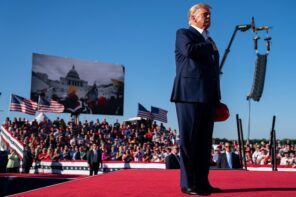The Faith and Freedom Coalition conference has largely been a predictable affair, with tried and true homages to American exceptionalism, the “traditional” family, the “sanctity of life,” and Paul Ryan’s budget. The conservative fixation on the alleged threat of shari’ah law hasn’t really taken center stage—except in an afternoon breakout session which featured a confrontation between the chief conspiracist of the “creeping shari’ah” threat, Frank Gaffney, and Marshall Breger, a Catholic University law professor, a Jew, a Republican, and a conservative, who has been critical of Gaffney’s shari’ah scare.
First, let’s set the stage. Devoted readers will recall that Gaffney had been banned from the Conservative Political Action Conference (CPAC) in February, after American Conservative Union board members rejected his conspiracy theories, including that ACU board members Suhail Khan and Grover Norquist were somehow part of a Muslim Brotherhood effort to take over the U.S. government and the conservative movement. (Khan even called Gaffney a “crazy bigot.”) At that conference, Gaffney’s proxies, including Andrew McCarthy and Cliff May, led a panel on what they claim is the threat of shari’ah to the constitution. It was an official panel, in a main ballroom of the conference.
Breger, along with Khan, were relegated to an unofficial panel, in a tiny room, on preserving religious freedom. There, Breger laid out why shari’ah law is no more scary than halacha, or Jewish law, and why conservatives and other Americans need not fear its infiltration into our courts which, Gaffney maintains, is happening as we speak. Khan and other panelists were confronted by followers of Gaffney, equipped with video cameras, about their supposed ties to jihadists, the Muslim Brotherhood, and other assorted bogeymen.
Here, at Faith and Freedom, Breger and Gaffney were on the same panel, described in the program as “Defeating Terrorism and Jihad,” but which was much more about the supposed threat of shari’ah than terrorism (in fact, Gaffney reiterated his claim that too many people overlook the supposed shari’ah threat, worrying about terrorism instead). When I interviewed FFC founder Ralph Reed at CPAC, he seemed to take, what I considered at the time, a slightly more measured view of the shari’ah “threat,” saying that he opposed a shari’ah “legal code” but stopped short of a full-on endorsement of shari’ah law bans. (That said, Reed does indeed understand his audience, and its fears.) The composition of the Faith and Freedom panel led me to believe he might have been attempting if not a rapprochement, then at least some balance.
Ironically enough, the panel followed one on alleged anti-evangelical bigotry, though few if any seemed to grasp that irony, with the possible exception of Breger. He led off, reiterating his position that shari’ah is not the threat some of his fellow conservatives assert. The moderator, neo-conservative conspiracy theorist Kenneth Timmerman, cut Breger off when he tried to defend himself against Gaffney. Gaffney, who insisted that even conservatives fail to understand the threat of a political, legal, and military takeover by shari’ah, at one point shouted “Rubbish!” in reaction to Breger. Gaffney’s fear-mongering knows no bounds, as he asserted that “if we don’t wake up, we will soon be like Britain . . . or even Saudi Arabia.” He had support on the panel, too, with the Christian Broadcasting Network’s Erik Stakelback calling him “the Paul Revere of calling out the Muslim Brotherhood.”
The audience was clearly in Gaffney’s camp, with murmurs of approval and even amens. One woman said she was from Minnesota, where “we practically have a Muslim state,” and fretted that Rep. Keith Ellison, who is a Muslim, adopted a Scandanavian name to mask his Muslim identity. She asked about something she’d “heard” about a “Muslim flag” being raised over the White House; Gaffney affirmed her paranoia, saying, “it is certainly possible we’d have a Muslim flag flying over the White House.” After laying into others in the conservative movement and accusing Norquist of being a Muslim Brotherhood sympathizer, Gaffney expressed hope that the Faith and Freedom Coalition would “take up the fight against shari’ah.”
Afterwards, I asked Breger if he thought Gaffney was dangerous. “I don’t want to use that word,” he said, adding “but I think the view that he’s espousing has the potential to have very deleterious consequences.”
Because George W. Bush said he was fighting terrorism, not Islam, Breger went on, the views of people like Gaffney were “marginalized” during the Bush Administration. But now, he maintained, conservative and Republican leadership are not “clamping down on extremists on their side.” The people “who do know better are not calling it out for what it is. They should be saying it’s not American to oppose an entire religion.” He added, “the adults, the responsible leadership, need to enlighten that fear and prevent it from undercutting our liberties.”




